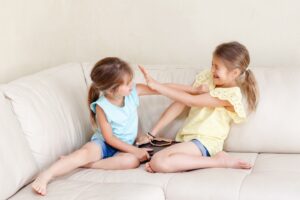Children like to shout – loudly and at the top of their lungs. As a parent, you are often overwhelmed by the child’s exuberant outbursts of rage. But it’s perfectly normal and part of every toddler’s development. And after all, the saying goes: anger is good for you. Isn’t it? It is usually difficult to assess when children’s anger turns into serious violence and at what point they need professional help.
Screaming attacks, tantrums, and insulting tirades are usually only half as bad as they seem to the parents. Toddlers are just getting to know their feelings, become impatient more quickly, and vent their anger with their screaming. Nevertheless, you have to set limits for your child. And above all, recognize when anger goes too far. When things are destroyed, siblings are hit or animals are hurt, anger can turn into aggression. If a child’s aggressive behavior is constant, it must be treated quickly.
We explain how to deal with tantrums in your child and how to reduce them.
Table of contents
Where Does Anger Come From?
To understand how to react to angry children, you must first look at the cause – as with any problem. So ask the question: Where does the anger come from in my child? In young children, anger can have many causes. In general, however, the following applies: Child development also includes the development of feelings. So, before his parents, the child must first understand for himself what it is in him. Recognize that this feeling, what makes for a redhead and a loud voice, is anger. Before this realization occurs, your little one has to try it out. In plain language, this means yelling loudly, banging on doors, and, unfortunately, belting out a word or two to you.
Looking at it from this perspective, anger does real good. By discovering this feeling, your child expands his consciousness and shapes his own individual a little further. Of course, not only the child’s behavior is important here, but also the parents’ reactions. If the parents – who serve as role models – deal with the child’s anger in a confident manner, the child will be able to control and understand it better.
Of course, children’s anger does not come from anywhere, but is triggered by a certain situation, a certain feeling. Often these include:
-
Frustration About Their Own Behavior:
Children can cope with failure and criticism even more poorly than adults. With younger children, this can occur when they do not succeed at something and are dissatisfied with themselves. Despair or impatience then quickly turns into anger. In contrast, frustration often turns to anger in older children when they feel they can’t please their parents.
-
Only My Will Counts:
Between the ages of two and three, anger can be understood as a desire for autonomy. The little ones want to assert their own will and try out all means to do so. If there is no candy or TV time is over, they scream, swear and stomp to change their parents’ minds. Under no circumstances should they give in to this!
-
Overdemand
Too much expectation from parents, or too much freedom from parents, can be the straw that breaks the camel’s back for children. If they have the feeling that they are not living up to their parent’s wishes, the excessive demands can turn into anger. In contrast, children can also become angry if their parents leave them with too many options. If the little ones are allowed to decide and determine everything, they are quickly overwhelmed and catalyze this feeling through anger. Excessive demands are also caused by an overload of stimuli. Sometimes everything is just too much for the little ones and they free themselves from this by expressing anger.
-
Lack Of Self-esteem
‘You’re not old enough for that yet! You’ll hurt yourself! Don’t do that, you can’t!’. Phrases like these cause young children to feel insecure. Parents’ strong protective instincts often lead them to overprotect toddlers in particular and not let them discover anything on their own. However, this can lead to a lack of self-esteem in the little ones and trigger anger in children. Through overprotective behavior, parents convey to their children that they can’t do anything on their own because they are too weak, too shy, or too lanky. This puts pressure on the little ones. They have the feeling that they are not allowed to make a mistake. In certain situations, even the calmest and most loving child can lose his or her temper. The children express their despair with tantrums.
-
Lack Of Exercise
Too much time in front of the TV, car rides that last several hours, or just sitting still while eating – kids need a lot of exercise to really let off steam. They have much more energy and quickly become jittery. If children can’t pursue their kinetic energy – by playing outside, for example – they often express their restlessness through tantrums.
Anger In Children – How To Deal With It
Despair and disappointment are generally the most common reasons for anger in children. If a situation – which the child sees as unfair – triggers a tantrum, it is therefore very important that you first show understanding. Of course, this doesn’t mean giving the little one his way every time he cries. For example, if your child starts to rage because he or she is no longer allowed to eat chocolate, signal to him or her that you understand his or her disappointment.
Remain Consistent
However, at the same time, explain to your toddler that in life you can’t always have your way and you can’t get everything you want. For example, you can say “I understand that you want to eat more of that yummy chocolate. However, you can’t just shout and then you get it. If I want to earn more money, I don’t start ranting and raving in front of my boss and he grants me the wish” If anger occurs with children, it is good overall if you put yourself on the same level with them. You do this by finding parallels in your own life – as in the example – and explaining them to your child.

Keep Calm
You are a role model for your child. It is therefore important that you do not become part of his tantrum but remains calm. In the best case, your calmness and composure will be transferred to the child. In the future, you should also pay attention to how you yourself behave in argument situations in front of the child. Young children in particular imitate the behavior of their parents. If you become abusive in an argument with your partner, your child will interpret this as the right way to deal with anger. If you are prone to violent outbursts of anger, be careful not to act them out in front of your child.
Refrain From Punishment
You can show your feelings. Therefore, you should not forbid small tantrums. Unless the anger in children turns into aggression. However, as long as no one is hurt, except your ears, you should refrain from punishment. That way, you show your child that it’s perfectly okay to be angry, disappointed, and upset at times.
Help, My Child Is Getting Violent!
Alarm bells should ring, however, if your child gets physical. There is a distinct difference between ‘showing your anger’ and ‘taking it out on others in an uncontrolled way’. In the beginning, many children cannot even handle their anger properly. This is where you should set clear boundaries to show your child, ‘That reaction wasn’t right’. If your child can’t control his anger properly and starts hitting the sibling, for example, a time-out in the nursery is the right way to go. You are thus punishing your child for his behavior and at the same time giving him time to cool down.
Especially among siblings, a fight can quickly lead to hand-wringing tantrums among children. The reason for this is jealousy between siblings. Here you can find out why it happens so often and how to deal with it!
Talk To The Pediatrician
Does your child’s anger increase quickly and is directed against people, animals, and the environment? If your child becomes aggressive intense situations, you should talk to a pediatrician. Some children need professional help to deal with their anger. Treatment teaches them methods to control their aggression.
Does your child’s anger often occur when playing with other children? Talk to kindergarten teachers or teachers first. Your child may be being bullied or feeling uncomfortable in the group and catalyzing this insecurity through his tantrums.
Of course, you can also try talking to your child about possible problems. Here are ten tips against bullying in child-friendly language!












